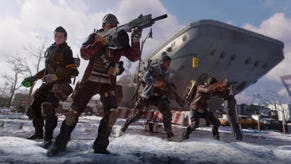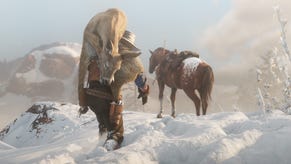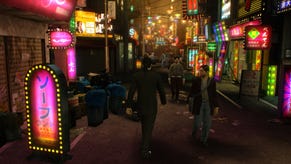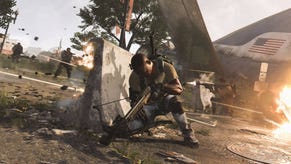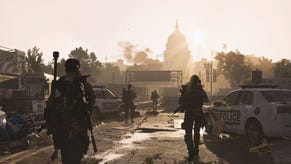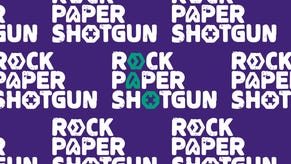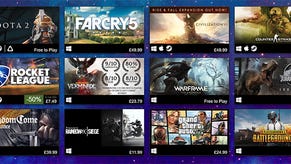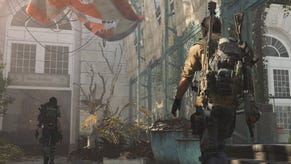Why The Division Is Better Than You Think
Beauty more than snow deep
Graham: Tom Clancy's The Division is out. It's a mish-mash of genres: a cover shooter, with realistic weapons, an emphasis on multiplayer and co-op, in which you kill enemies in order to level up and find new loot as in an RPG, set among the looted streets of a post-viral collapse New York. It feels like a collection of well-observed trends, packaged together under a covering of very pretty snow. It's much more fun than I, at least, was expecting.
If I wanted to make you click the read more button, I'd say it was a better RPG than The Witcher 3. Our full review will be along early next week, but until then you can come read me justify that statement in conversation with Adam.
Adam: Don’t be daft. It’s a better cover shooter than The Witcher 3, sure, but as far as RPGs go it falls somewhere between Dragon Age II and Mass Effect 3. I haven’t played either of those games.
There was a brilliant moment when we were playing a couple of days ago when I suddenly realised I was a cleric. I have a gun that shoots area effect healing domes, I run up close to the mobs of baddies and fire my tiny little SMG into their faces - which is a lot like laying on hands to turn the undead - and... I’m not sure how to integrate the incendiary grenades into this particular analogy because they clearly belong to some kind of elemental wizard. Not a cleric’s bag, all that burning.
But the important thing is this: Mr Clancy’s The Division has successfully tricked me into playing what is effectively a very MMORPG type of thing, with kiting of enemies and big bosses that take loads of effort to kill, and parties made up of characters with specific skills and purposes. It’s not an MMORPGs because there’s nobody else around, for the most part, but it’s a lot like all the bits of MMORPGs that I definitely don’t like.
And yet, here I am, thoroughly enjoying every minute I spend playing this big old bastard of a game.
Graham: I played the beta and I saw the draw of its progress mechanics: complete missions to expand and improve your base, basically. But I figured that was it. The enemies are bulletsponges and the guns consequently felt unsatisfying to wield, and I figured I'd never play it much because progress is compelling but ultimately meaningless and I have limited time.
I've been surprised then to find its pleasures lie deeper. I'm not being (entirely) facetious when I say it's a better RPG than The Witcher 3. Like you, I'm enjoying that characters are made with specific skills and purposes. I feel like I'm making important decisions when I upgrade my base and decide which new room to add (and consequently which skills to unlock), and when I then decide which of those skills to take with me in the field. I didn't experience that so early on when levelling Geralt.
Those decisions improve the shooting, too. Enemies are still absorb absurd amounts of damage, but I'm now incentivised to pursue headshots because a passive ability gives me a 50% chance of keeping the bullet if I do. My main active skill is also a small deployable turret, which means that suddenly the semi-automatic rifle I have - which seemed initially useless - has a role because the turret gives me space to carefully pick my shots.
It's... it's kind of great, Adam. I've had great fun flanking bads with you.
Adam: Remember when we went to the Sewer Morgue? It was a sewer but instead of being full of poo and wee, it was full of poo, wee and hundreds of dead bodies. I think they were pox bodies. It was a horrible place. We killed some people down there and I’m not even sure what they were doing - did they want to live in the Sewer Morgue? That doesn’t seem right. Maybe they were trying to occupy the Sewer Morgue as a form of political protest?
Whatever the case, we killed those people and we trudged through the poo, the wee, the blood and the bodies because we are heroes and that is what heroes do.
The point I’m making here - and there is a point, honestly - is that it shows what great company I am that we had a good time in the Sewer Morgue. It is not the kind of place people generally go to when they want to have a good time, but we had a blast.
For a while I thought the entirety of The Division might be a bit of a Sewer Morgue - a big stinking corridor that we were enjoying trudging through only because the company was good. But it isn’t - the progression feels like it might just be endless grind, in the way that enemies get tougher as your guns get stronger, sort of cancelling each other out, but there’s just enough variety in the baddies, for now, to keep me interested.
And the flanking is important! We actually do tactics and everything when we’re playing and that’s the key to the whole thing for me. You’re not just watching numbers go up in your inventory and down on the enemies’ health bars, you’re trying to figure out how to make the numbers go down faster by using the environment to your advantage and communicating as a team.
I agree. It’s pretty great. Do you think the enjoyment will last? We’re only level 7 or 8, right? You might be more because you were playing with other people while I was working though, you hussy.
Graham: I felt pretty bad about that. I guiltily played through some wholly inconsequently side missions and hoped I wouldn't unwittingly level up and throw us out of sync.
I can see the enjoyment lasting, at least for as long as I have people to play with. Like you, I don't think it's only fun because we're playing together, but it is slightly lonely when playing it alone. There is plenty of story to try to support you, in the way that story can be a comfortable hammock that holds up all the activities of a game, but it's story in that contenty way that you get with MMOs. You create a character, but you don't talk, you don't have a personal journey, it's not a singleplayer game. So it feels like you're watching the low budget webisode spin-off to some Showtime series, while the real heroes and characters are off somewhere else.
But aside from that loneliness, yeah, I think it'll remain fun. It's not just that it has introduced enough enemy variants to keep it interesting - machinegun guy, melee guy, melee guy with shield, flamethrower guy with explodable gas tank, etc. - but that it seems to understand things about the cover shooter that a lot of other games with waist-high walls don't. Mainly, that it's not really about the cover. It's about how that divides an arena into tranches (and trenches, I guess) of progress, and supports defined tactics like flanking and covering fire.
MMOs normally have concepts of "mobs", who stand around waiting for heroes to come around and bosh them for treasure. The Division is really good, better even than the scifi world of Destiny, at giving a structure to encounters by putting you at one side of a space with enemies in fixed emplacements at the other side. We had one particular mission that was difficult, in that we died a couple of times in the same space, but it felt methodical and satisfying to change our tactics and work out how to take out the combination of sniper and rocketlauncher men that had us pinned down. That's the level design as much as anything, mapping our progress of thought on to the physical progress of advancing through the arena, low wall by low wall.
Adam: I was so relieved when we died. It made me feel good that we were actually capable of fucking things up - we didn’t lose because we were out of our depth, in terms of being in a high-level area - we lost because we didn’t do things the right way.
And then I was even more relieved that when we ran back to the fight, we didn’t just try the same thing again and whittle away a little more, so that we could repeat the dying and the respawning and the whittling until we won by default.
We had to go back into the fight with a new approach.
So, yes, The Division gets the really important stuff right. It’s a good cover-based shooter and it’s much more tactical than people might think from the outside looking in. But you know what else is important? The details.
The animations are great. I commented on the quality of the wounded Division agent early in the game. It’s a shame that I don’t care about the actual conversations in the cutscenes because they’re quite attractive to watch. And even though I’ve complained, while we’re playing, that the streets all start to look a bit samey, I’m impressed by how legible the world is. Different enemy types have certain tells, as well as UI pop-ups to identify when they’re going to throw down suppressing fire or use some other skill. I struggled to identify loot and restock locations at first but I’ve learned to read the screen now and find it very easy to use.
You know what I hate though? You do know because I grumble about it whenever I have to go in the base. I hate that there’s no menu interface for all the HQ upgrades. I have to walk around the bloody place to collect ammo and grenades that I’ve built upgrades SPECIFICALLY to provide for myself. It’s tedious busywork and I am very cross about it. Extremely cross.
The HQ is basically the way you level up your character so having to walk around it to unlock things and collect things every time you visit is a bit like having to swim through Geralt’s arteries, Fantastic Voyage-style, so that you can inject elixirs directly into his muscles and organs. RUBBISH.
Graham: There are lots of details I like. I'm enamoured with the snow. It's not just a that they've made snowy textures; it's that they've made a textured world, then put the snowy texture on a surface on top of that. So you can climb on top of a red truck and move around and your footsteps melt the snow, revealing more of the red truck underneath. All the streets of New York do start to look the same, but there were multiple occasions where I had to stop and take screenshots while we were jogging somewhere. It gives good mist, good puddle, and some of its weather effects affect the game, too, in that fog can roll in dynamically during missions in the open world spaces and force you change up your tactics.
You pointed out to me at one point too that the items hanging from your backpack actually reflect what you're carrying. I love that. I love that I can see my grenades and water bottle back there. I also like parts of the interface - it's quite customisable, and it's nice having my health and ammo marked near the center of the screen rather than way down in a corner.
But there's also lots of details that bug me. Like the bases, yes, which is like running around that old Doom-style interface for Windows 95 in order to access your folders and files. But also the interface for crafting or sorting through gear, which makes it too easy to think you've equipped something when actually you've unequipped it, which changes or hides prompts in such a way that it's easy to accidentally recycle items you wanted to keep, in which double-click doesn't do what you think it will and in which you're sometimes required to press space or F rather than use the mouse at all. These are small things, but small things you encounter a lot given how much of the game is about comparing loot stats and selling or deconstructing what you don't want for parts. For their cloth parts.
Adam: I think our readers should know that playing The Division with you has been like being the proud parent of a toddler who is seeing snow for the first time.
“LOOK AT IT IT’S ALL WHITE AND SMUSHY AND THE FOOTPRINTS AND WOOOOOWWWWW”
The snow is great, it really is, but there are people with flamethrowers and they are trying to burn us to death. And, of course, now I’m wondering if the flames melt the snow at all because that would be awesome.
We’ve talked about that lovely trip to the Sewer Morgue, when we took in all the sights down below. What about the time we went to the Dark Zone and made some new friends?
The Dark Zone is the only area in the game where players can kill one another. When we’re playing in the rest of the city, we don’t see other players, just AI characters. We can summon backup when going into a mission but otherwise, it’s just the people in our group that inhabit this particular instance of New York.
That all changes in the Dark Zone. Suddenly, there are other humans and they might not be trustworthy. I’ve seen lots of comparisons to DayZ - that creeping sense that people might betray you at any time, which makes running into other players so unnerving, is certainly similar. I think it’ll be the best part of the game, The Dark Zone, and it’s not just because of the tension and potential for interesting social interactions (murder; theft), it’s also the way that the loot system has been turned on its head to encourage those interesting social interactions.
We died before we could actually salvage anything - killed by an AI character with an axe while high-level players watched, silently - but do you know how all of that works?
Graham: I think so. Or at least the core of it: you fight groups of NPCs enemies, who have a chance to drop special Dark Zone gear. That gear is better than what you're likely to find in the open world or story missions, but it can't simply be walked out the front door and into the rest of the world. Instead you need to call in an extraction helicopter to take it out, and doing so sends up a flare that alerts all other players in the vicinity to what you're doing. They might come over to attach some ill-gotten loot of their own. Or they might come over to bean you across the brainpan and steal what's yours for themselves.
It has similarities with DayZ, but it's more than that. Ubisoft seem to understand that "trust" is a bulging vein of potential within videogames. Boardgames have been playing with it for a long time, but videogames only very recently. Most Ubisoft games seem to do so; playing with disguises in online Assassin's Creed, pretending to be an NPC while hacking other player's games in Watch_Dogs, and now the uneasy alliances of the Division's Dark Zone.
I'd like to play it more, if only to work out whether it's worth playing more while still relatively low level. We did OK against the NPCs who were a few level above us, but I fear that it might quickly be populated by players who are three times our level and to whom we consequently pose no threat.
You asked me whether I thought the game had legs. Do you? You're headed to GDC tomorrow, but would you rather be staying home and shooting men with me next week instead of visiting American diners and attending cool parties (and occasionally playing a VR game for work)?
Adam: I’ve been so annoyed by how little time I’ve had to play this week. That doesn’t happen very often. I’m usually happy to log out of my Steams and my Uplays and what have you when the work day is done so that I can watch a terrible atrocity of a football match or go for a walk to the pub.
But The Division is an evening game. That’s a rare thing. I want to carry on playing it right into the night.
Would I rather be going to GDC though? Just about. I once told an American friend that there are four great American artforms: Jazz, roads, baseball and breakfasts. Those diners call to me.
Thinking about GDC, and all the splendid things that will be there, it strikes me that The Division is distinctly untrendy. It’s a big, slightly confused and highly polished release with a somewhat vague online component, and ultraviolence at every corner. It’s the kind of game that has TV spots that make my friends chuckle and say, “that is what Adam does for a living. He plays games about horrible things happening and grim-faced people playing hero by shooting everyone. Isn’t he the silliest person in the world?”
It’s an easy game to roll your eyes at or sneer at, but what a lovingly crafted thing it is. I have no idea quite what changes were made and what ideas were thrown out during that long development cycle, but the end result is a much smarter game than the surface appearance might suggest. And I’m very glad that it exists.
The Division is out now for Windows.










